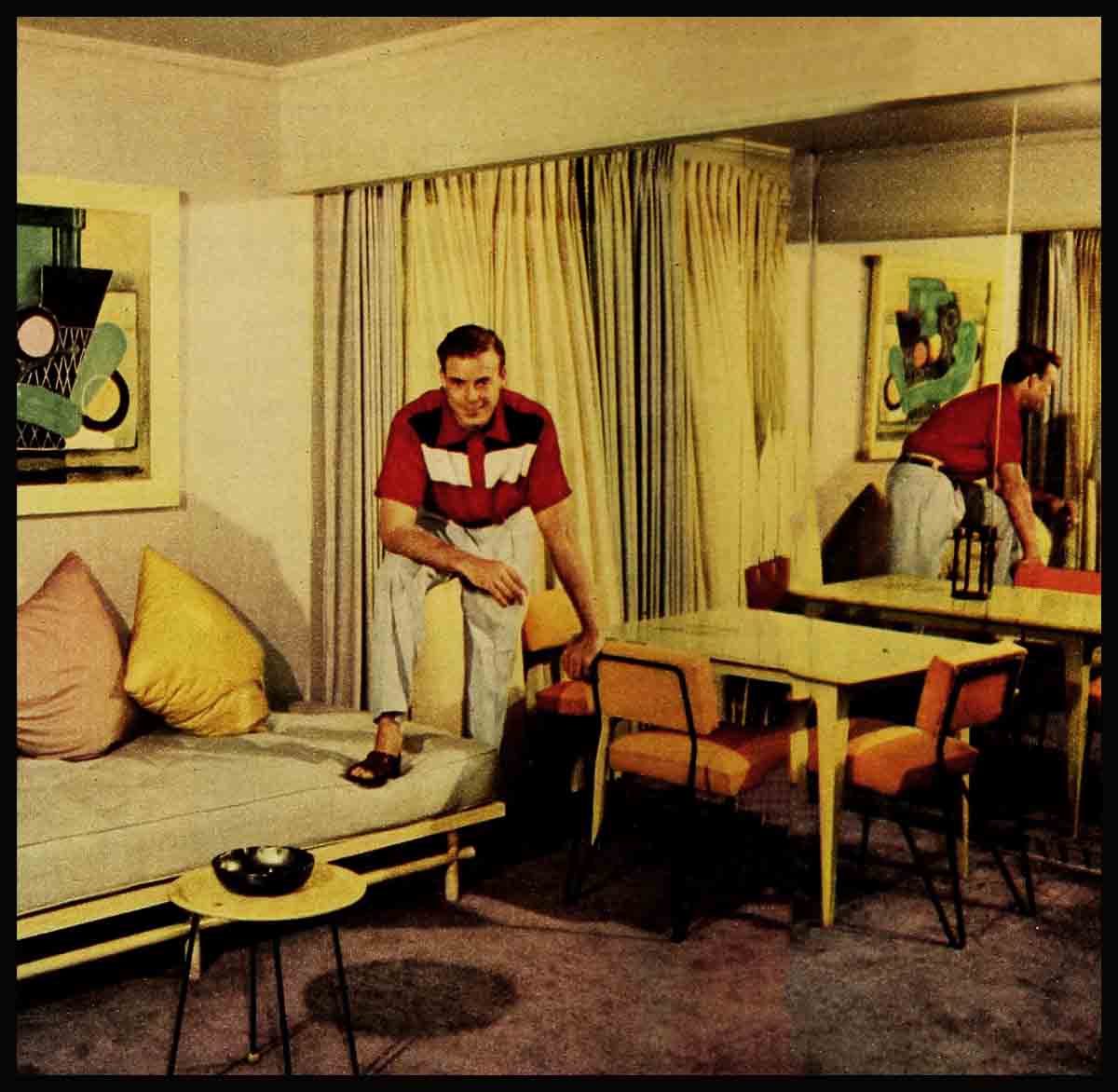
Up In Scott Brady’s Place
It was six A.M. of a beautiful winter’s day in Westwood Village, a small, fashionable community four miles from 20th Century-Fox.
In the low, white apartment house where Scott Brady lives, everyone was sleeping except Brady. The tall, tousle-headed kid from Brooklyn was preparing breakfast in the kitchen of his bachelor apartment. The preparation sounded like an atomic bomb somewhere in Nevada.
Pots and pans bounced off the floor, Scott’s baritone voice bounced off the ceiling, towers of smoke swirled up from the frying pan, and water gushed from the taps at full speed.
The bedlam woke Scott’s kid brother, Eddie, who happened to be spending the night up at Brady’s place. He was sleeping in the soft, foam-rubbered daybed that serves as the living room couch. Eddie raised himself on one elbow. “For cryin’ out loud,” he shouted, “what’s goin’ on out there?”
“I’m getting breakfast,” Scott shouted back.
Eddie got up and shuffled into the kitchen “Hey, you don’t have to go to all this trouble for me.”
“No trouble,” Scott said. “I do this every morning.”
Eddie rubbed his scalp. “You do?” This was a surprise to the youngest. of the Tierney clan, because when Gerald Tierney lived at home—that’s Scott Brady’s real name—he was the one Mom had to call and shake for 15 minutes before he’d even turn over, never mind get up.
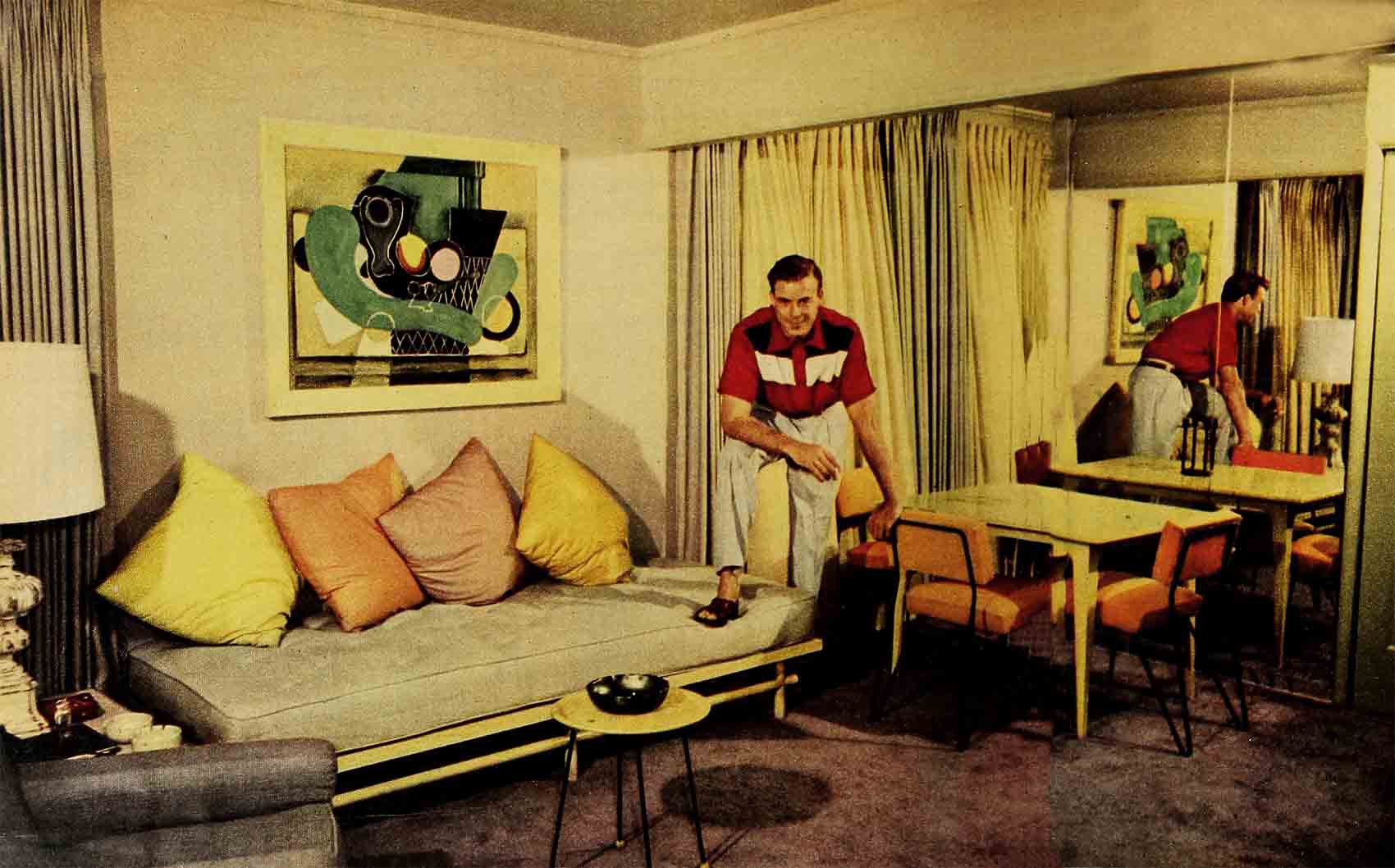
Now here he was in his own kitchen, bare-foot, stripped to the waist, wearing only a pair of blue jeans and cooking like crazy. With a tumbler full of chilled orange juice in one hand, he stood in front of his stove shifting his attention from burner to burner. In one skillet a dozen slices of Canadian bacon sputtered beautifully. A chemex of coffee on the back burner sent up an appetizing aroma. And on another, Scott had set his piece de resistance, an omelet of eggs, chopped onions and cheddar cheese.
Eddie couldn’t believe it. “You been goin’ to a cooking school or something?”
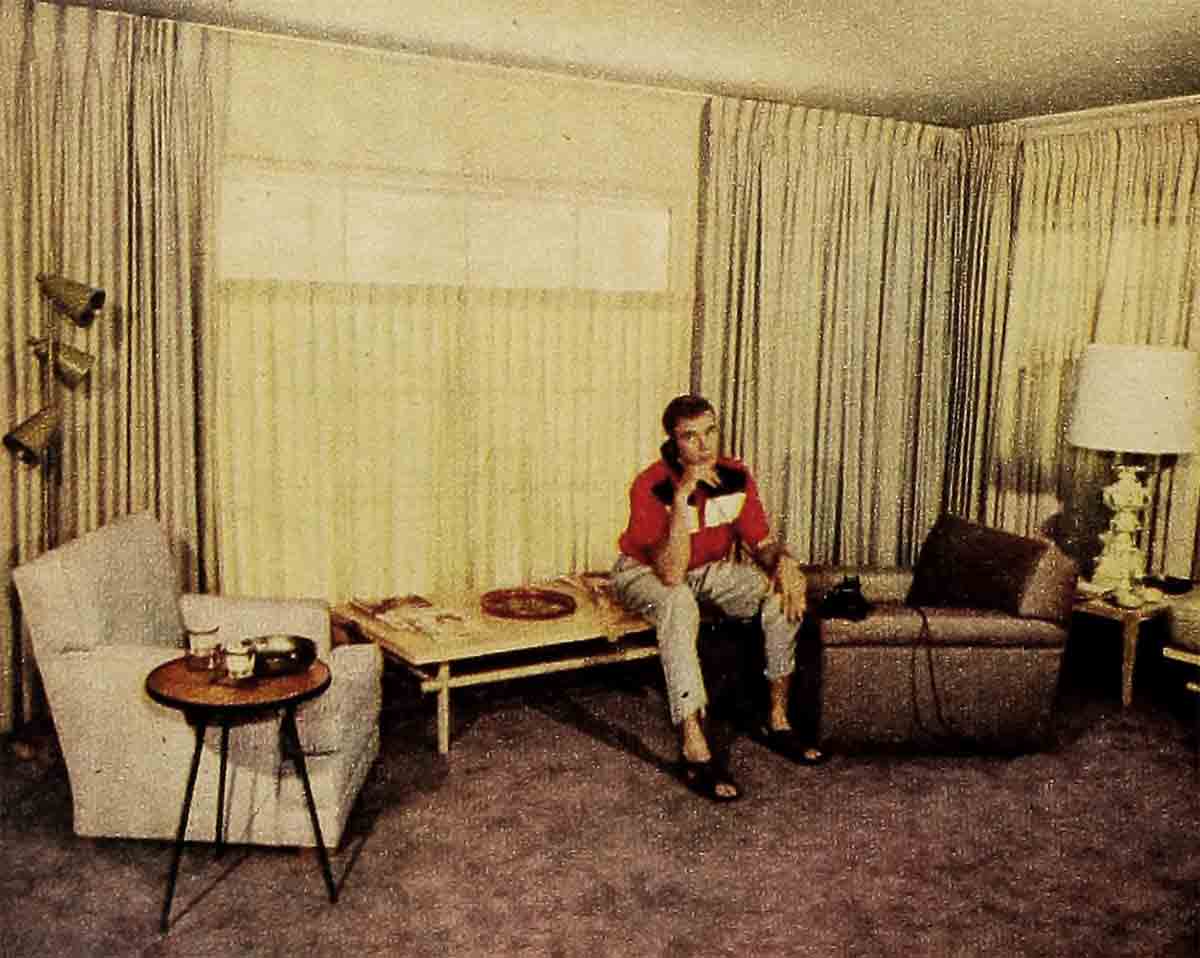
Scott grinned. Like a master chef he flipped the omelet onto a platter, removed a tin of hot rolls from the oven, put the coffee on the table, and then motioned to his brother. “Sit down, kid,” he said, “and have a little food.”
Eddie sat, but the wonderment of it all was too much for him. “I don’t get it,” he confessed. “At home you never even ate breakfast.”
“Gee, kid,” Scott explained. “I couldn’t ask Mom to fix me a big meal at six in the morning. I don’t mind doing it myself, but you couldn’t ask that of any woman, not even Mom. Besides, I like looking after myself.”
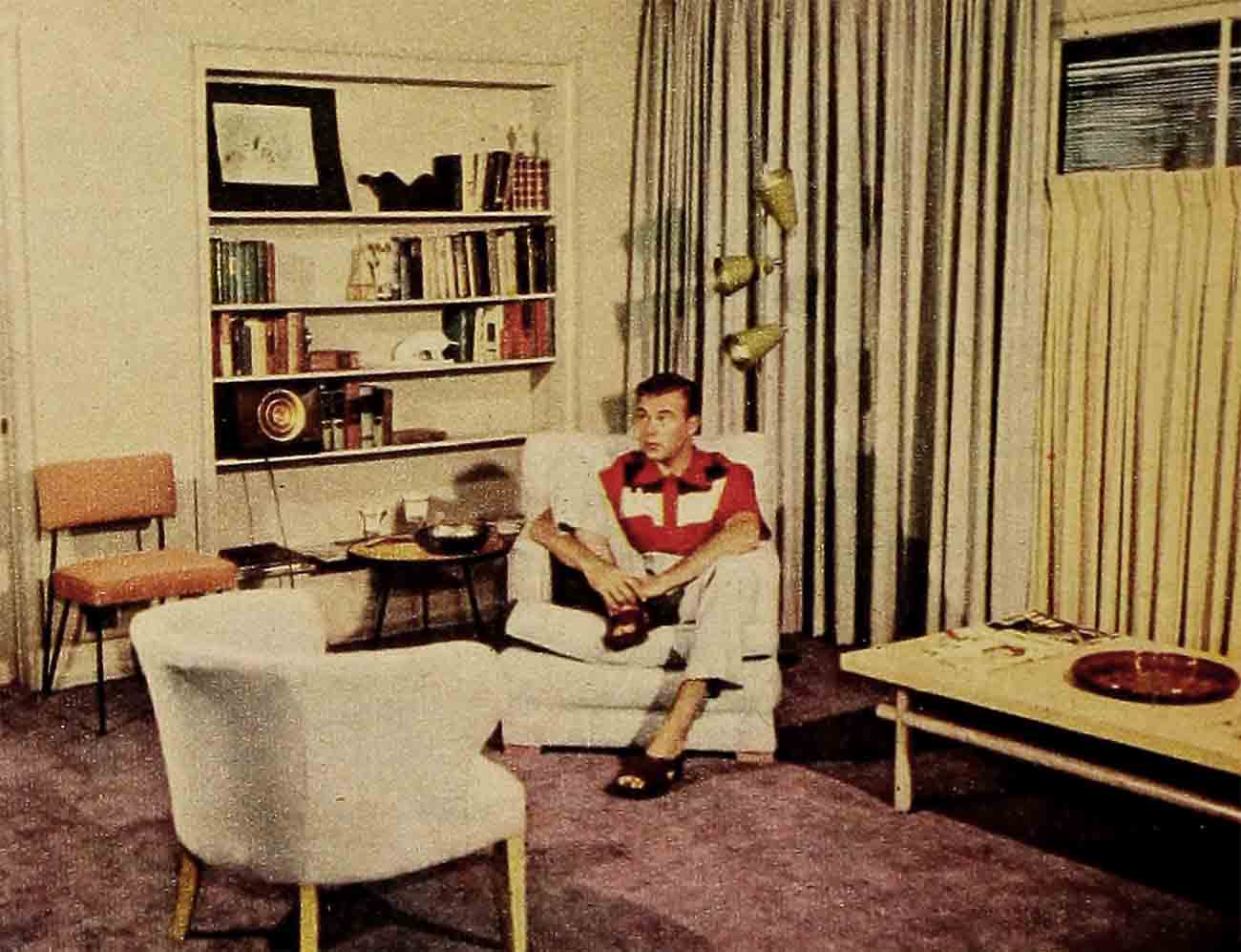
Ever since Scott announced six months ago that he was leaving the Tierney family apartment to live alone, his folks have wondered why.
A friend suggested that perhaps Scott wanted to have a place of his own where he might entertain his friends, especially of the opposite sex. After all, there’s a lot of competition in the Tierney family. Let Scott bring his date home and introduce her around, and the very next thing anyone knows, Scott’s date is no longer Scott’s. The girl has switched to Larry or Eddie.
When you ask Scott if this is the reason he took a bachelor apartment, he hedges and says, “Not at all. I just wanted a little privacy.”
In direct contradiction to this explanation is the fact that Scott is rarely alone. In and out of his apartment, he is usually accompanied by one of his two brothers, his agent, or his stand-in.
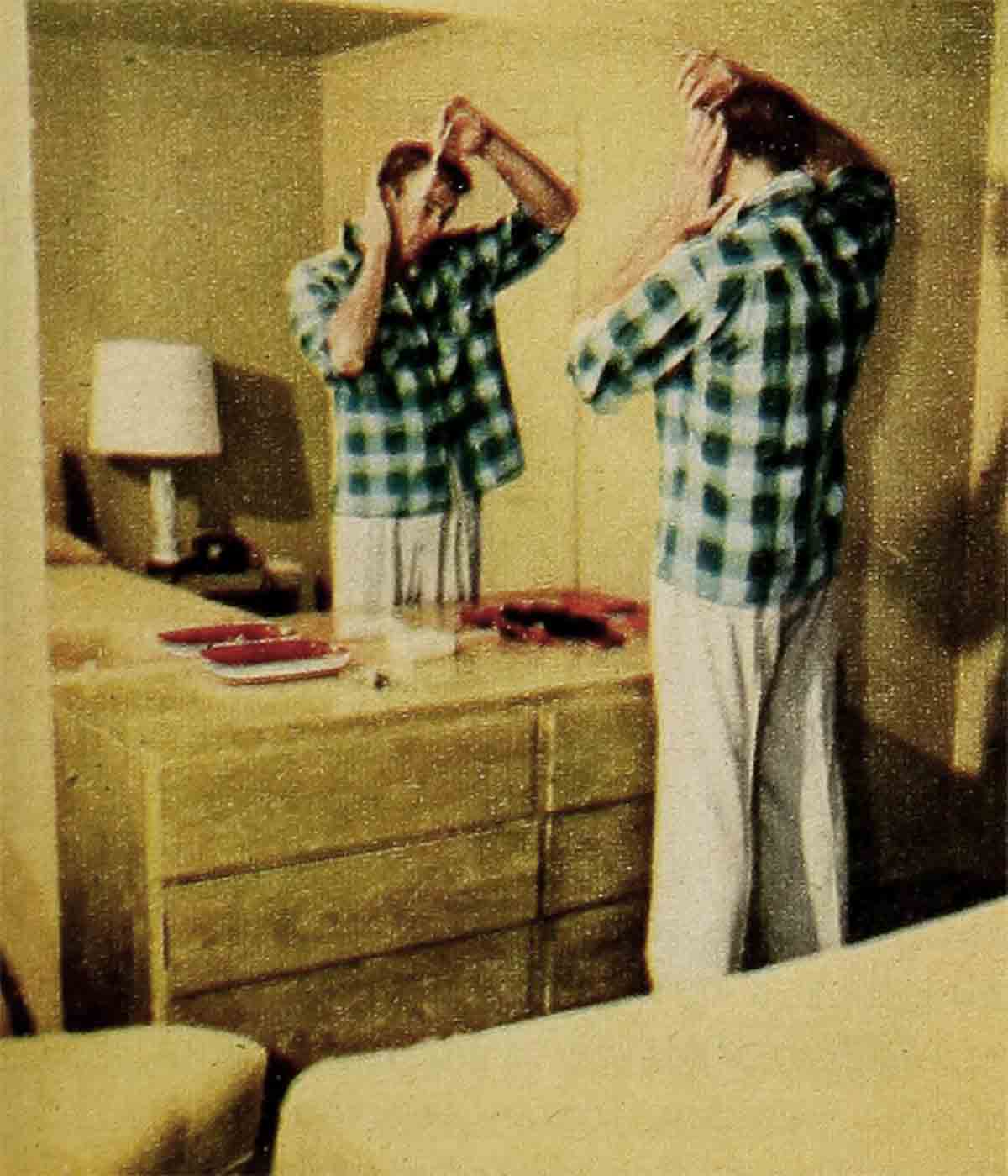
Brady isn’t particularly articulate or profound and sometimes he finds it difficult to explain things, but actually his bachelor apartment is simply part of his growing up, of going out on his own.
Scott isn’t sure when the idea of looking for an apartment first struck him, but it probably coincided with Johnny Darrow’s getting him a couple of big pictures at Universal and two at 20th Century. Johnny is a top agent who helped June Allyson, Gene Kelly, and Van Johnson all got their start at Metro. When Johnny came over to the Tierney place one afternoon and told Scott that his chances of working regularly seemed pretty fair, Scott approached Mom with the revolutionary idea of moving out.
“What would you say, Mom,” he asked, “if I rented a small bachelor deal some place and gave you an extra room?”
Like the truly understanding mother she is, Mrs. Tierney smiled her consent. “Roddie, I always want you to do what will make you happy.”
“I think that’s it, Mom.”
So they kissed and after that Scott called Joe Zboran, his stand-in, and the two fellows met and piled into Scott’s convertible. They drove out Sunset Boulevard in the direction of Westwood. On his way to the studio a few weeks before, Scott had seen a group of partly finished apartment buildings in the vicinity. The one that struck his fancy was a job with wrought-iron balconies. Each apartment in the building had its own entrance so that it seemed like a small separate house. In addition, a private patio came with each apartment, and they were all large, sunny, and unfurnished.
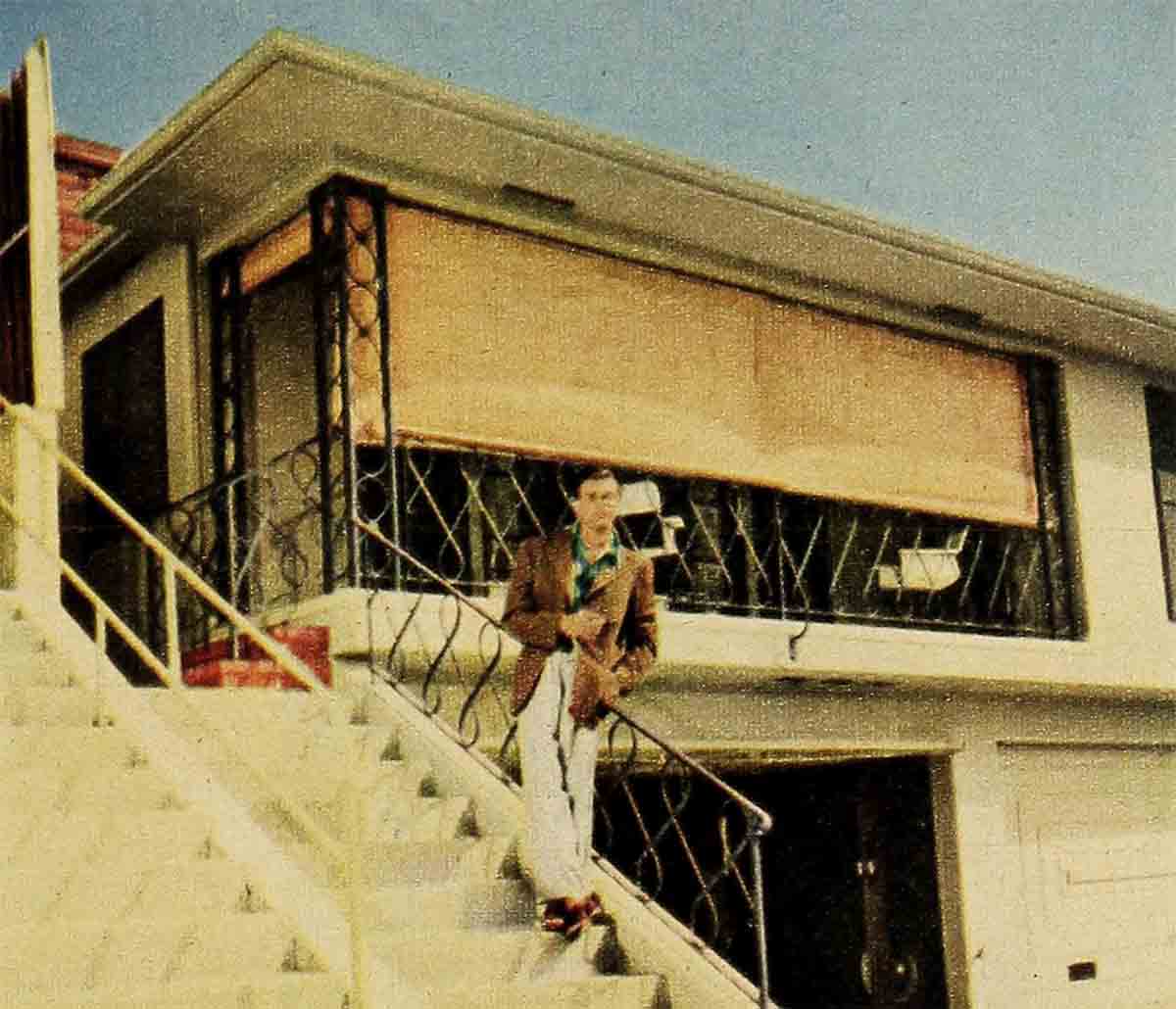
Scott left a $20 deposit on a three-room job—living room, bedroom, and kitchen. There was also a terrace that came with the place, and Scott felt this was a necessity because where are your friends going to hang around when the living room gets jammed up?
Apparently, furnishing a home was a subject Scott had been thinking about for some time. In his indirect, half-scoffing manner, he’d been studying homes in Hollywood. The two he admired most belonged to Johnny Darrow and Chuck Walters, the MGM film director. Both places had been decorated by a versatile young designer named Paul Fox.
It so happens that Fox is one of these generous characters who spends his spare time helping his friends furnish their homes. His regular job is chief set director at 20th Century-Fox, where he’s been responsible for much tasteful decor, especially in such films as Laura, Elopement, Let’s Make It Legal, and half a dozen others.
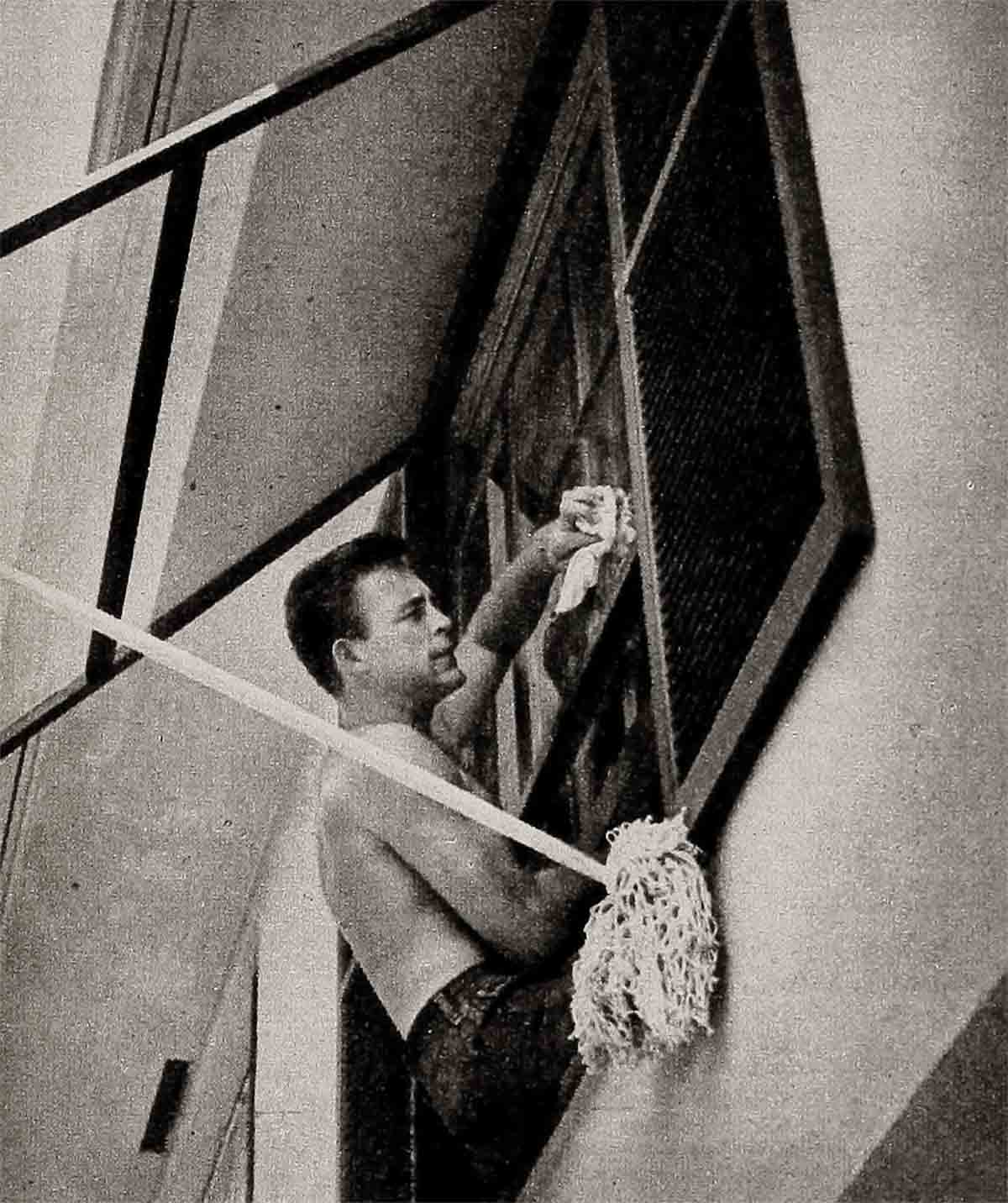
As soon as he signed his apartment lease, Scott Brady called on Paul Fox.
“Paul,” the actor began, “I’ve just . . .”
Fox held out his hand. “Don’t tell me. Let me guess.” They surveyed the apartment, and Paul agreed that the simple, open-floor plan would lend itself perfectly to modern furnishings.
“Anything you say is okay with me,” Scott said flatly. “I just want you to furnish the place completely. And remember that I’m broke.”
In the large main room, Paul used a lot of beige and brown. The carpet, draperies and upholstery are all beige and the wooden pieces are done in natural blond finish so as not to show the dust. Fox believes that a monochrome room is not only basically masculine but much more restful and easier to live in than one that’s jumping with color.
He’s not completely anti-color, however, which is why the upholstery on the dining room chairs is burnt orange, and a very vivid Braque painting hangs over the couch. Actually the Braque is a copy. It was painted by a studio man who specializes in copying famous art treasures.
Paul’s reason for placing it so conspicuously is because, “Scott instinctively likes good paintings without knowing a thing about art. The room needed one important picture and since the guy couldn’t afford an original at this point gave him the next best thing, a good reproduction.”
“I like the painting,” Scott says, “because it isn’t too pretty. It also arouses a lot of criticism, and I like to hear what my friends think about it.”
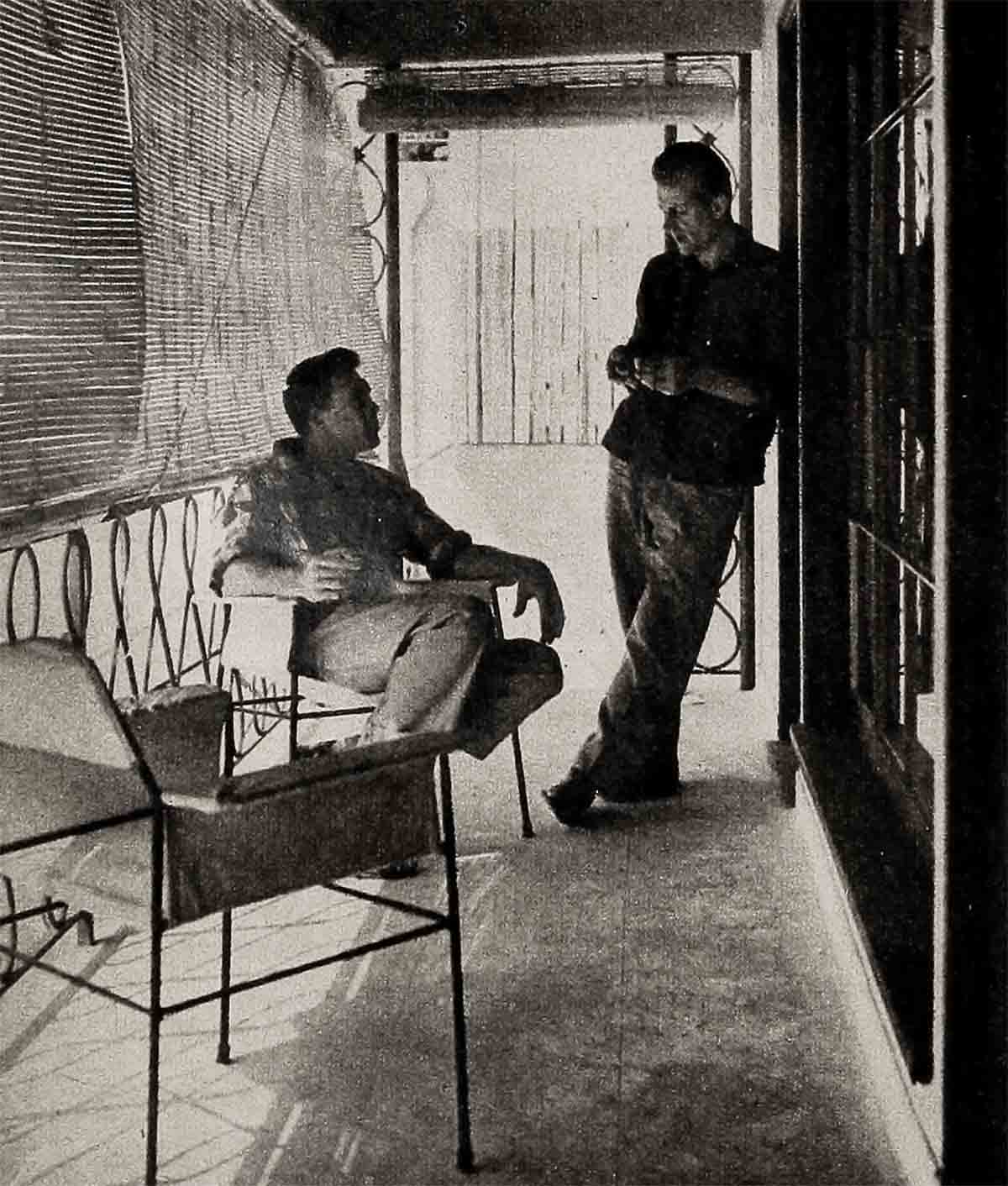
Scott also owns several small originals done by a promising local artist named John Morris. He puts on an act of not caring very much about them, and he says he hung them just to fill up wall-space, but the truth is that he chose them because basically they’re abstract, and that’s the sort of stuff that appeals to him.
Having decorated a number of bachelor homes, Paul Fox has some definite opinions about men versus women’s taste in home decorating. He thinks men are less afraid to try new ideas and will follow their own predilections in the face of custom and convention. Scott, for example, chose black wrought-iron furniture for the dining room. It’s tough and durable and very easy for a bachelor to maintain. And yet, relatively few single girls would approve of iron furniture indoors.
Similarly, Scott’s lamp table is a piece of accoustical board set in a wooden frame. This sort of material is normally used to soundproof ceilings, but Scott didn’t care. He found it stylish and practical. He also okayed two easy chairs and a foam-rubber couch without arms. “They make sense to me,” he says.
Because of the deep yellow bedspread and draperies, he calls the bedroom “My Gold Room,” but this doesn’t prevent him from tossing his clothes around helter skelter. Brady is the kind of man who just lets his clothes drop off when he heads for bed. He does keep his dresser drawers neat, however. “One of the nicest things about living alone,” he points out, “is that there’s no one to yell at me.”
Just the other evening, Scott had his brothers and a couple of pals in for steaks before the Thursday-Nite poker session got underway. As the boys were sitting around, letting their dinner settle, Eddie observed that the apartment was just about perfect. “This is a pretty nice joint,” the kid brother volunteered. “All it needs now is a woman’s touch.”
Scott shook his head. “Listen, kid,” he said. “If there’s anything I’ve learned in this racket, it’s to leave well enough alone. Stop being a marriage broker, and go get the chips. You’ll find them in the oven.”
THE END
—BY MARVA PETERSON
(You can see Scott Brady now in his latest 20th film, The Model And The Marriage Broker.—Ed.)
It is a quote. MODERN SCREEN MAGAZINE MARCH 1952




